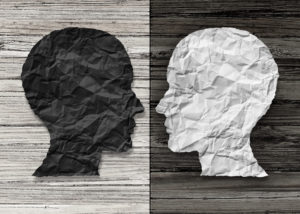Psychological health and substance use are interconnected, as they both influence our choices, behaviors, and overall well-being. Not every person who drinks alcohol or does drugs has a mental health disorder. However, people suffering from mental illness are more likely to partake in drug or alcohol abuse and develop severe addictions than those who don’t. Likewise, individuals struggling with drugs and alcohol are more likely to have (or develop) a psychological condition.
In 2018, 9.2 million adults in the United States had at least one mental health condition and substance abuse disorder in the past year. Additionally, almost half of adults with a serious mental illness used illegal drugs at least once over the previous year, compared to just 16% of those without a psychological diagnosis. In the same period, binge drinking was also more common among people suffering from a mental health condition[1].
In the medical world, patients with both a mental illness and a substance abuse disorder have what’s called a dual diagnosis or co-occurring disorders. At Northbound Treatment, we find that recovering addicts are most successful with integrated treatment plans that take into account their mental, physical, and emotional health. That’s why we’re proud to offer a dual diagnosis program in Orange County.
So, what is dual diagnosis and how does the rehab program work? Consider this your guide to dual diagnosis rehab. Keep reading to find out what to expect from this type of program, how co-occurring disorders are diagnosed, why dual diagnosis treatment is a critical component of recovery, how to find a program, and more about dual diagnosis rehab.
Dual Diagnosis Program: What to Expect
A dual diagnosis rehab program is an integrated treatment approach to drug and alcohol addiction rooted in compassion and understanding. To determine the appropriate treatment and develop personalized treatment plans, rehab centers must have a thorough understanding of each client’s health status, lifestyle, and personal history. This includes their physical state, information about any psychological setbacks or past trauma, current medications, and previous diagnoses. In some cases, a patient may have an existing diagnosis for a mental illness, yet in many instances, psychological conditions are identified at the beginning of treatment.
Diagnosing Co-Occurring Disorders
There are a variety of dual diagnosis examples when it comes to treatment plans. But generally, on the first day of rehab at Northbound Treatment, clients undergo a biopsychosocial assessment that looks at the connection between the physical, psychological, and socio-environmental factors of their condition. This personalized and in-depth approach helps us ensure effective treatment. If one or more mental health conditions are present along with substance abuse or addiction, our patients are diagnosed with co-occurring disorders and can begin a suitable dual diagnosis program.
How Does Dual Diagnosis Rehab Work?
The overarching goal of dual diagnosis rehab is to help clients understand the effects their co-occurring disorders and substance abuse have on each other and what it means in terms of getting sober. If addiction is addressed without simultaneously examining mental health, it can inhibit the path to recovery and increase a person’s risk of relapsing. A dual diagnosis treatment program helps clients develop the tools and life skills necessary for long-term sobriety by taking a critical look at all components of addiction.
When you participate in Northbound’s dual diagnosis rehab program, you’ll have the opportunity to work through all obstacles standing in the way of your sobriety, emotional peace, and fulfillment. Your dedicated treatment team of addiction counselors, therapists, and clinicians will help you determine the underlying cause (or causes) of your drug or alcohol abuse, identify triggers, learn healthy coping strategies, and ultimately reclaim your life.
After detoxing from drugs or alcohol and overcoming physical dependence on a substance, recovery moving forward will be almost all psychological. Of course, your physical health will improve without the presence of drugs in your body. Yet maintaining your sobriety and successfully returning to a “normal” life outside of rehab will be a primarily mental challenge.
Our flexible dual diagnosis programs include a variety of treatment approaches and therapies based on each client’s unique condition, experiences, and preferences. Your rehab plan will likely involve a combination of individual counseling, group therapy, process groups, cognitive behavioral therapy, experiential therapies, and other evidence-based treatments.
Why Dual Diagnosis Treatment Is Essential to Recovery
Many psychotherapists and rehab centers don’t have the capacity or qualifications to treat both mental illness and addiction. Sometimes, patients end up going back and forth between clinics, which can be time-consuming. It can also make it hard for each provider to effectively treat a condition, as many crucial details and medical information aren’t properly relayed. Other times, individuals receive treatment sequentially[2]. But since rehab is a mental health journey in and of itself, the best way to heal is to focus on both conditions at once.
Sadly, in many cases, individuals only receive treatment for one condition. This might be because their provider is unaware of a co-occurring disorder or simply ill-equipped to treat it. When the other is ignored or not diagnosed, it can make rehab ineffective, lead to a worsened mental state, or both[3].
Here at Northbound Treatment, we strongly believe that, for many addicts, dual diagnosis rehab is essential to recovery. Addiction specialists, doctors, and counselors need a clear understanding of the entire picture to ensure you get the care you need. Also, with your entire treatment team and all your appointments in one place, your experience will be more streamlined and time-efficient.
Finding a Dual Diagnosis Rehab Program
According to research by the Administration and Policy in Mental Health and Mental Health Services, only about 18% of rehab programs and 9% of mental health programs meet the criteria for providing dual diagnosis treatment[4].
In some cases, individuals are denied care by single-diagnosis providers if they struggle with a co-occurring disorder. For instance, PTSD (post-traumatic stress disorder) programs often won’t accept patients with substance abuse disorder[5]. With so few treatment centers equipped to treat co-occurring mental illness and substance abuse, it can be difficult for addicts and their loved ones to find the right dual diagnosis treatment program.
Northbound’s rehabilitation center is proud to offer a comprehensive dual diagnosis program as part of our full continuum of care. If you’re struggling with addiction and also suffer from mental illness (or think you may have a psychological condition), please reach out. We’re welcoming new patients every day, and we’d love for you to join us. If we aren’t able to meet your needs, we’ll refer you to a facility that surpasses our standards of care.
Insurance Coverage for Dual Diagnosis Treatment
Under the Mental Health Parity and Addiction Equity Act and additional protections from the Affordable Care Act (ACA), insurance companies are legally obligated to cover both mental health treatment and substance abuse treatment. On top of that, both are now classified as essential healthcare, meaning you don’t have to meet your deductible for your coverage to kick in.
FMLA Protections
Drug addiction and alcoholism can make it difficult to keep up with your work performance. For this reason, it’s not uncommon to lose a job due to substance abuse issues. However, the Family and Medical Leave Act (FMLA) requires employers to allow up to 12 weeks of unpaid leave each year for medical reasons, including integrated treatment for substance abuse and mental illness. This means you’re entitled to take time off for dual diagnosis rehab at an inpatient or outpatient treatment center. You don’t have to lie to your employer about your reasons for taking time off, and your job will be there when you get back.
Northbound’s Dual Diagnosis Program in Orange County
At Northbound Treatment, we offer rehab for alcoholism and addiction to a wide range of drugs, including heroin, stimulants, prescription opioids, marijuana, benzodiazepines, methamphetamine, cocaine, and designer drugs. We’re also fully qualified to treat a variety of mental health conditions at our Orange County treatment centers. This includes PTSD (post-traumatic stress disorder), trauma, OCD (obsessive-compulsive disorder), codependency, personality disorders, eating disorders, bipolar disorder, anxiety, and depression.
The decision to begin treatment isn’t easy, especially if you’re entering co-occurring disorders treatment. Our experienced and caring team understands how difficult it can be to take that first step. We want you to succeed, and we’re here to guide the way. From helping you navigate your insurance benefits to assessing all aspects of your health and history to providing you with the tools you need to achieve lifelong sobriety, Northbound Treatment is committed to your success and happiness.
Call us at (888) 978-8649 to get started with dual diagnosis treatment.
External sources:
- https://www.samhsa.gov/data/sites/default/files/cbhsq-reports/NSDUHNationalFindingsReport2018/NSDUHNationalFindingsReport2018.pdf
- https://www.psychologytoday.com/us/blog/the-anatomy-addiction/201110/what-is-dual-diagnosis
- https://medlineplus.gov/dualdiagnosis.html
- https://www.ncbi.nlm.nih.gov/pmc/articles/PMC3594447/
- https://www.drugabuse.gov/sites/default/files/rrcomorbidity.pdf










